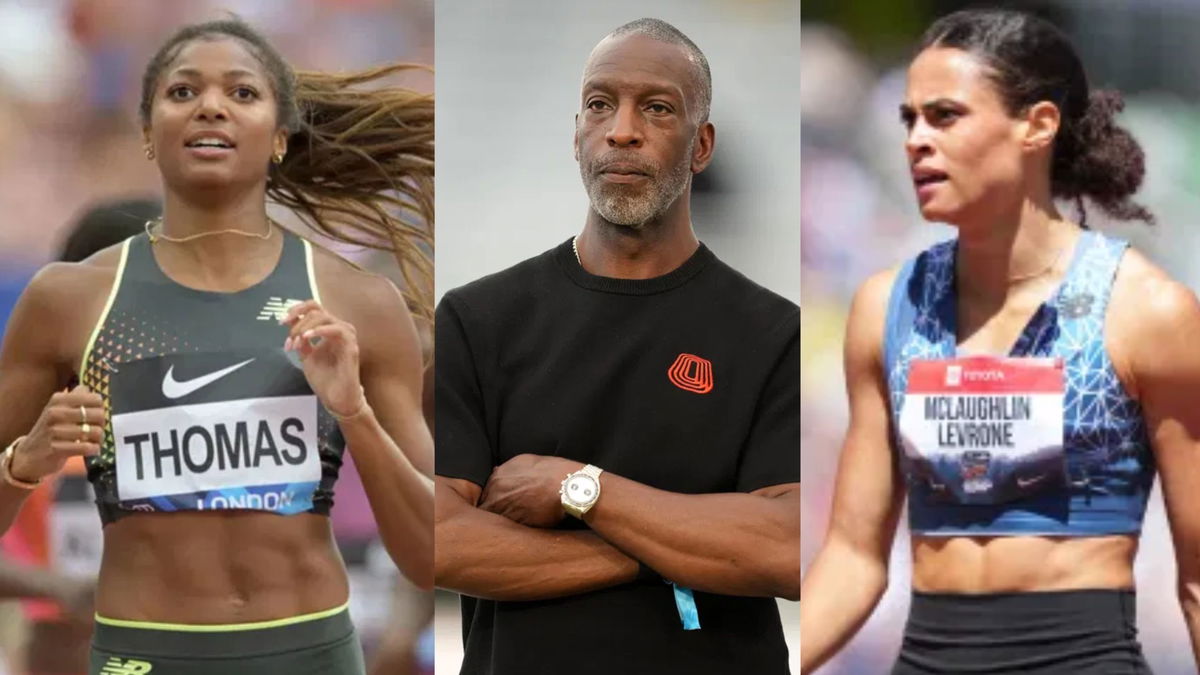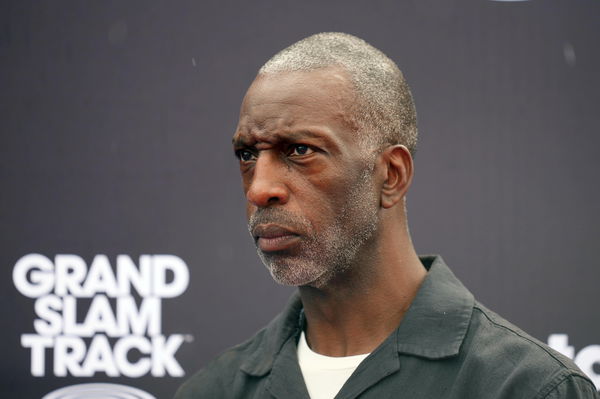
Imago
Gabby Thomas, Michael Johnson and Sydney McLaughlin-Levrone (Image Credits: IMAGO)

Imago
Gabby Thomas, Michael Johnson and Sydney McLaughlin-Levrone (Image Credits: IMAGO)
Michael Johnson once promised that Grand Slam Track would redefine his sport. When the four-time Olympic champion unveiled the project, he spoke of a new era in which elite runners would be treated as “true professionals.” The league announced last September that it had “secured $30 million in financial commitments,” and Johnson declared his ambition to elevate track and field beyond the fleeting spotlight of the Olympics and World Championships.
Watch What’s Trending Now!
But what followed bore little resemblance to that vision. Five months after its launch in Kingston, Jamaica, the league has collapsed into debt, with its fourth and final meet in Los Angeles abandoned before it could take place. For Johnson, who also built his reputation as a trusted commentator for the BBC, the mounting crisis now threatens not only his league but also his standing within the sport. Behind the closed doors of investors and athlete contracts lies a shortfall of nearly $19 million, unpaid wages, and the sudden exit of a key backer.
This has caused some agents to worry that their clients may never get their money, while others are thinking about taking legal actions. In fact, at the center of the unraveling are the athletes who believed in his plan. Sydney McLaughlin-Levrone, fresh from another Olympic triumph, is still awaiting $250,000 in prize money. Gabby Thomas is owed $180,000. And they are not alone.
ADVERTISEMENT
Melissa Jefferson-Wooden has yet to see her $300,000, while Kenny Bednarek is waiting for the same figure, and Josh Kerr has more than $160,000 outstanding. “Everybody’s patience is wearing thin,” said agent Paul Doyle, who represents more than a dozen GST competitors. Despite Johnson’s assurances, only the promotional fees from the opening Kingston meet have been paid. The $3.2 million in prize money from that event has never reached the athletes’ accounts.
The money problems stem from a gap between what was promised and what was delivered.
GST’s September 2024 press release cited $30 million in secured financial commitments, yet, according to reports by The Athletic, it now concedes that only $13 million was ever received. The remaining $19 million existed as an option, not an obligation, for lead investors Winners Alliance. Reportedly, an additional $30 million was discussed with Eldridge, a $70 billion asset management company chaired by Todd Boehly, but that investment never materialized. After attending the first Kingston meet, Eldridge declined to move forward.
ADVERTISEMENT
Johnson told agents that global economic instability had chilled investor confidence, though Eldridge insiders insist their concerns were centered on the league’s business model.
Top Stories
Patrick Mahomes’ Dad Faces 10-Year Prison Sentence After Chiefs QB’s Father Reportedly Violated Probation Terms

PGA Tour Split Into Two as Scottie Scheffler Confirms Stance on Patrick Reed’s Return

Multiple PGA Tour Pros Stopped from Playing as WM Phoenix Open Round Is Canceled Over Recurring Problem

Scottie Scheffler Faces Scrutiny After Taking Out Anger on Golf Club at WM Phoenix Open: ‘Washed’

“Stay Right There on the Bench”: LSU’s Grace Knox Faces Backlash After Heated Moment in 64-77 Loss vs Texas

Justin Jefferson Makes Final Decision on Joining Buffalo Bills After Further Damaging J.J. McCarthy Relationship


Imago
Track & Field: Grand Slam Track Miami May 4, 2025 Miramar, FL, USA Michael Johnson reacts during the Grand Slam Track Miami at Ansin Sports Complex. Miramar Ansin Sports Complex Florida United States, EDITORIAL USE ONLY PUBLICATIONxINxGERxSUIxAUTxONLY Copyright: xKirbyxLeex 20250504_hlf_al2_126
For athletes, the delays were cloaked in shifting explanations.
ADVERTISEMENT
First, they were told drug-testing protocols caused the holdup. Weeks later, Johnson cited retreating investors. In June, GST weighed canceling the Philadelphia meet, but the event went ahead. By mid-month, the Los Angeles finale was abandoned, leaving athletes, agents, vendors, and even World Athletics awaiting overdue payments. Staff inside GST were laid off or saw their pay reduced by 15 percent. The financial hole now exceeds $14 million, and Johnson is left searching for fresh capital while promising a return for a second season.
Grand Slam Track’s debut had been dressed with lavish touches. Athletes and their guests were flown to Malibu for content shoots and luxury outings. The format offered larger purses than the Diamond League, with $100,000 for a first-place finish and a guaranteed minimum of $12,000 per meet, even for those at the bottom of the standings.
ADVERTISEMENT
Johnson’s concept was designed to attract attention and reward excellence, but without firm capital, it has collapsed into a cautionary tale. In a joint statement, GST and Winners Alliance insisted they “remain steadfast in our commitment to bringing in new investment partners.” Yet for McLaughlin-Levrone, Thomas, and dozens of others still awaiting checks, that promise has already worn thin.
Now, adding to this, BBC removed Michael Johnson from its athletics coverage as his reputation came under strain from the collapse of Grand Slam Track.
ADVERTISEMENT
BBC drops Michael Johnson from athletics coverage after Grand Slam Track fallout
Michael Johnson’s enduring presence on BBC’s athletics broadcasts came to an abrupt pause as the broadcaster chose to distance itself from him in the aftermath of the Grand Slam Track collapse. Since 2001, he had been a fixture in the studio, lending authority and precision to nearly every major championship, from Olympic finals to the World Championships. That continuity ended just as his credibility was being tested in the wake of unpaid commitments and unfulfilled assurances tied to his new project.
BBC’s decision carried weight not only because of Johnson’s long association but also because of its timing.
His position had seemed untouchable: A 24–year role built on insight that had accompanied every generation of athletes since Athens 2004. Yet the shadow of unresolved debts proved too large. The broadcaster, long a platform for his measured voice, withdrew from that association at the moment when he most needed stability. For Johnson, the break cut deeply, for his role as an analyst had become integral to his post-competition identity, reinforcing the authority once gained through his Olympic triumphs.
ADVERTISEMENT
Johnson himself had admitted to shortcomings. “We promised that athletes would be fairly and quickly compensated. Yet here we are struggling with our ability to compensate them.” That acknowledgment, intended as candor, coincided with the broadcaster’s quiet removal of his name from its forthcoming coverage in Tokyo.
What might once have been seen as a temporary setback has now reshaped his professional standing. The decision signaled that the reputational toll of the Grand Slam Track’s unraveling had moved beyond athletics and into the institutions that had upheld his authority for more than two decades.
ADVERTISEMENT
ADVERTISEMENT
ADVERTISEMENT